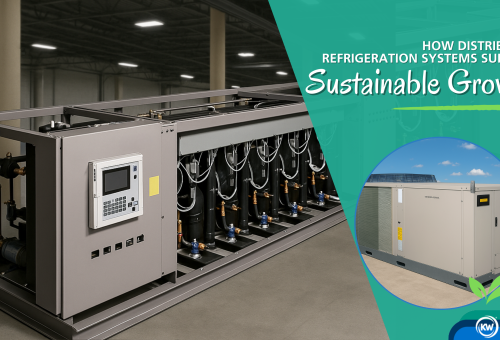How Distributed Refrigeration Systems Support Sustainable Growth

As sustainability becomes more than just a buzzword for retail grocery and turns into a mandate from customers, regulators, and the planet, the refrigeration systems behind the scenes are taking center stage.
At the heart of this shift there is one solution that’s quietly changing the game: distributed refrigeration systems. Efficient, modular, and adaptable, these systems support long-term energy savings while answering the growing demand for sustainable commercial refrigeration.
Kysor Warren, a leader in energy-efficient refrigeration systems, has embraced the distributed approach not only for its performance but for how it aligns with a future of smarter, greener retail.
What Is a Distributed Refrigeration System?
Traditional centralized systems rely upon a large rack with multiple rows of large compressors and bulky headers , typically found in a back room or on the roof, to serve the entire store. Distributed systems, on the other hand, decentralize the load.
Think of it like this: instead of one heavyweight quarterback calling every play, you’ve got a smart team of specialized players working their zones.
Kysor Warren offers horizontal (such as the Compact Scroll System) and vertical (including the Distributed Scroll System) designs to fit store layouts, along with CO2 systems (the ECO2Mini System), making distributed systems especially appealing for:
- Store expansions and remodels
- Urban or non-traditional footprints with limited mechanical space
- Operators looking to reduce refrigerant charge and piping runs
The Sustainability Advantage
One of the biggest wins with distributed refrigeration systems? Environmental impact. Here's how these systems stack up on the green scale:
1. Reduced Refrigerant Charge
By shortening the piping distances and reducing overall volume, distributed systems typically use far less refrigerant than centralized systems. That’s a win on multiple levels, especially when using natural refrigerants like R290 (propane) or CO2.
Not only do you cut down on environmental risk from leaks, but in case of a leak, the smaller charge limits the potential damage.
2. Energy Efficiency
Distributed systems allow for better load matching and control. Rather than firing up a large rack to service an entire store, compressors can cycle independently, reducing energy waste during off-peak hours.
Add in variable-speed technologies and smart defrost management, and you’ve got an energy profile that’s leaner than ever, which is perfect for both your bottom line and your sustainability targets.
3. Heat Recovery Opportunities
With smaller zones and closer proximity to loads, waste heat can be captured and reused more effectively (for water heating or even in-store HVAC support), something that’s harder to do efficiently in a centralized layout.
Scalability and Flexibility
Whether you’re running a compact urban convenience store or a sprawling suburban grocery center, distributed systems scale to match. This adaptability supports:
- Phased remodels: Install one zone at a time without disrupting the entire store.
- Regional climate differences: Configure zone-specific systems to address varying heat loads.
- Future upgrades: Easier to add capacity or update technology in a modular system than overhauling a central plant.
And let’s not forget footprint. Horizontal designs like Kysor Warren’s Compact Scroll System (CSS) can even be mounted above a walk-in cooler, making use of space that would otherwise go to waste.
Designed for the Real World
One reason distributed refrigeration is gaining so much traction is because it’s built for how retailers actually operate.
Maintenance access is more localized and simpler, reducing downtime. Systems can be isolated without impacting the entire store, allowing for repairs and upgrades with minimal disruption. Plus, each distributed pack can be outfitted with its own controls and diagnostics, helping store operators catch inefficiencies before they become problems.
Pair that with Kysor Warren’s industry-leading customer service and technical support, and you’ve got a solution that works in the real world, not just in theory.
Sustainability Without Sacrifice
Too often, “sustainability” is seen as a trade-off - you give up convenience or pay more upfront to meet environmental goals. Distributed refrigeration systems flip that script.
You get operational flexibility. You gain control over your energy footprint. You save on long-term maintenance. And with the ECO2Mini and other systems that use propane, you do it all while supporting a cleaner, more responsible future.
That’s what makes distributed systems, and the people behind them at Kysor Warren, such a smart choice.
Ready to Rethink Refrigeration?
If you’re looking to build or remodel with energy efficiency, sustainability, and performance in mind, a distributed system might be the exact fit you didn’t know you needed.
Contact Kysor Warren today to learn more about the Distributed Scroll System, Compact Scroll System, ECO2Mini, and how they integrate with sustainable commercial refrigeration strategies built for tomorrow’s retail.
Let’s build cooler stores. Smarter stores. Greener stores.
Because smart refrigeration isn’t just about what you’re chilling. It’s about what you’re building for the future.